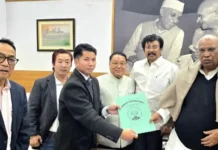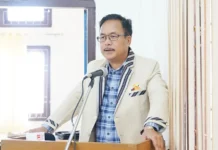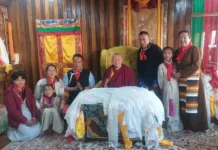Monday Musing
[ Junroi Mamai ]
Rationalization of transfer and posting of teachers was one of the longstanding demands of various student organizations of the state, and many have hailed the recent en masse transfer of 203 teachers in the state.
Education Minister Pasang Dorjee Sona has termed the transfer and posting a major part of Mission Shikshit Arunachal-2029. According to the minister, the step has been taken to ensure that sufficient numbers of teachers are posted to rural areas in remote districts of Arunachal.
Sixty-seven teachers from East Siang district, more than 60 teachers from the ICR, 35 from West Siang district, 13 from Papum Pare district, and nine from Lower Siang district have been transferred to remote areas and districts like Anini, Anjaw, Shi-Yomi, Kurung Kumey, Tirap and Changlang.
The education minister has termed it a foundational, reformative step towards overhauling the state’s education scenario.
This abrupt decision, however, did not go down well with the state’s teachers as many found it unjust and against the existing transfer and posting policy.
The Arunachal Teachers’ Association (ATA) has appealed to the state government to reconsider the mass transfer and posting of teachers, saying that the orders were issued mid-session, which could disrupt the academic activities of the students. The ATA has asked the government to make the order effective from the next academic session instead.
The teachers’ association has urged the government to consider issues like proper station seniority, medical cases, spouse joint posting, children’s education, lady teachers, etc, before issuing transfer and posting orders to over 200 teachers in the state.
The issues that the teachers have raised are genuine, considering the fact such en masse transfer and posting mid-academic session could have an adverse impact on the students at large. Also, most of the time these transfers and postings are carried out based on a pick and choose method. There are many teachers who are serving at a particular place of posting for years while others are transferred many times over to different remote places of posting, which is clearly unjust.
Now some of them may go to the court and challenge the order, which will evidently lead to delays in implementing the transfers and postings in several parts of the state. What will become of the students whilst both the state government and the teachers are in a never-ending tug of war? Already there is a statewide shortage of subject teachers, especially for subjects like mathematics and science, besides English and Hindi. The impact of all these developments is visible statewide within schools in remote districts. Currently, many students in remote areas like West Kameng district are waiting for teachers to join their duties, but considering the current state of affairs, any immediate relief is unlikely.



